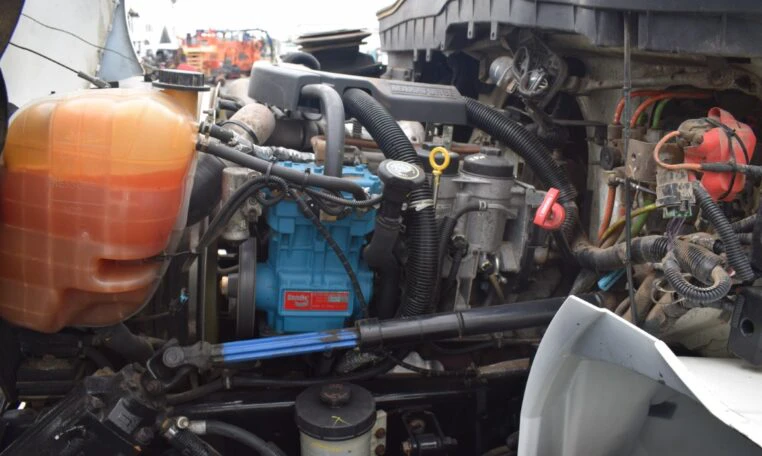
The safety and well-being of truck drivers should always be prioritized in the transportation industry. Fleet managers play an important role in ensuring that drivers are not only productive but also safe on the roads.
Here are four essential practices every fleet manager should implement to enhance truck driver safety.
1. Implement Regular Safety Training Sessions
Bucket and vacuum truck drivers come across a unique set of challenges on the road.
From operating complex machinery to maneuvering in tight spaces and around obstacles, their safety is very important. Here\'s where continuous safety education becomes a cornerstone of a robust safety program.
Why Continuous Education Matters

The transportation industry is constantly evolving. Traffic patterns change, regulations are updated, and new hazards emerge. Regular safety training sessions ensure drivers are equipped with the latest knowledge and skills to navigate these complexities. These sessions offer several key benefits:
Sharpened Defensive Driving Skills: Defensive driving techniques equip operators to anticipate and react safely to unexpected situations on the road. Training can cover hazard recognition, proper following distances, and effective braking techniques.
Staying Up-to-Date on Traffic Laws: Traffic laws can be revised periodically. Regular training updates drivers on changes in regulations, ensuring they operate legally and avoid costly citations.
Safe Handling of Hazardous Materials: Vacuum trucks often handle hazardous materials like liquids, sludge, or debris. Training on safe loading, unloading, and spill prevention procedures is crucial for worker and environmental safety.
2. Enforce Strict Adherence to Rest and Work Hours

Operating bucket trucks and vacuum trucks requires a high level of focus and skill.
However, driver fatigue remains a significant threat, jeopardizing not only the driver\'s safety but also the safety of everyone on the road.
Fatigue\'s Devastating Impact
Exhaustion can impair a driver\'s reaction time, judgment, and situational awareness – mirroring the effects of alcohol or drug intoxication. Drowsy drivers are more likely to drift out of lanes, miss critical traffic signals, and struggle to react to sudden hazards.
This is especially concerning for drivers of large, specialized vehicles like bucket trucks and vacuum trucks, whose size and weight magnify the potential consequences of an accident.
The Role of Hours of Service (HOS) Regulations
To combat driver fatigue and ensure safety, fleet managers have a responsibility to enforce Hours of Service (HOS) regulations. These regulations establish the maximum number of hours a driver can spend behind the wheel and mandate mandatory rest periods. By adhering to HOS, drivers have sufficient time to rest and recover, reducing the risk of fatigue-induced accidents.
ELDs: Technology for Enhanced Safety
Electronic Logging Devices (ELDs) have revolutionized how fleet managers monitor and enforce HOS regulations. ELDs automatically track a driver\'s driving time, on-duty time, and off-duty periods, providing real-time data and ensuring compliance. This eliminates the need for paper logs, which were prone to errors and manipulation. With ELDs, fleet managers can proactively address potential fatigue issues and prevent drivers from exceeding their allotted driving hours.
3. Conduct Regular Vehicle Inspections and Maintenance

Bucket trucks and vacuum trucks are workhorses in various industries, but their immense utility comes with inherent safety concerns.
A well-maintained truck is demonstrably less likely to be involved in an accident. Fleet managers have a responsibility to establish a rigorous schedule for regular vehicle inspections and maintenance.
This proactive approach prioritizes the safety of drivers by ensuring:
Reliable Brakes: Regular brake inspections and servicing are paramount. Worn brake pads or malfunctioning hydraulic systems can lead to catastrophic consequences. Proper maintenance ensures drivers have complete control over the vehicle, especially when navigating uneven terrain or stopping at height.
Safe Tires: Tire health plays a major role in maintaining traction and stability. Routine checks for wear and tear, proper inflation levels, and any signs of damage are essential. Faulty tires can cause blowouts or reduced handling, posing a serious risk to drivers and those around them.
Functional Lighting: Bucket and vacuum truck operations often take place in low-light conditions. Ensuring all headlights, taillights, turn signals, and work lights are functioning properly is crucial for visibility and preventing nighttime accidents. Additionally, proper lighting helps maintain awareness of the truck\'s position during operation.
Flawless Systems: Regular maintenance goes beyond basic components. Inspecting hydraulic systems, outriggers, and boom functions for leaks, damage, or malfunction is vital. These systems are the backbone of bucket truck operations, and any issues can compromise stability and lead to serious accidents.
4. Provide Safe and Comfortable Rest Areas
Rest areas are crucial for drivers to recharge and rest. Fleet managers should ensure that drivers have access to safe and comfortable rest areas during their routes. These areas should be equipped with basic amenities such as clean restrooms, adequate lighting, and security measures. Comfortable rest areas help drivers to rest properly, reducing the risk of fatigue-related incidents.
Are you looking to purchase high quality and well-built used bucket trucks in Texas? Check out the range of top-quality and well-maintained bucket trucks and street sweeper trucks for sale at Big Truck & Equipment Sales.
They are the the leading choice for robust vacuum trucks, used bucket trucks, digger derrick trucks, and much more. Contact them today to learn more about their bucket trucks for sale in Texas.
About the Author
Barry J. is an expert in heavy-duty vehicle maintenance with over 20 years of industry experience. He writes informative blogs to help readers make informed decisions about bucket trucks and vacuum trucks. Barry’s insights and practical tips are trusted by professionals and enthusiasts alike. When he’s not writing, Barry enjoys restoring classic cars, exploring off-road trails, and spending quality time with his family. His passion for vehicles extends beyond work, making him a true authority in the field.


